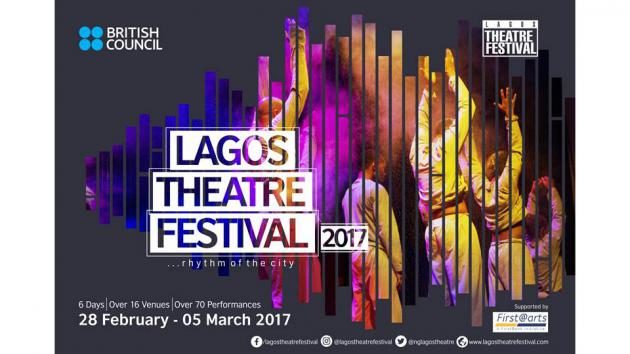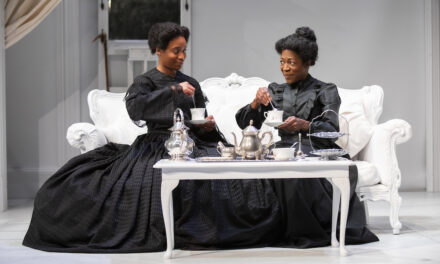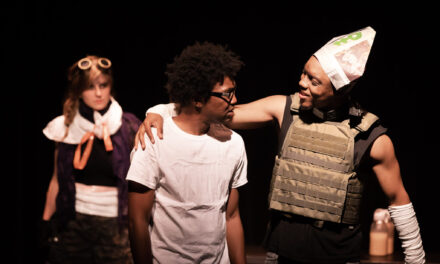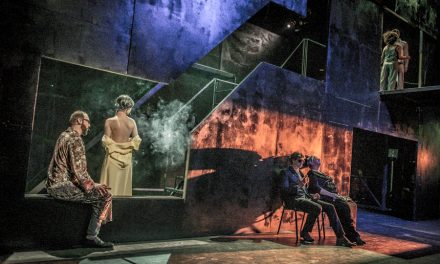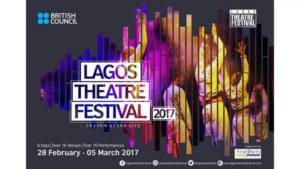
Promotional poster for the Lagos Theatre Festival
Credit: britishcouncil.org.ng
The Lagos Theatre Festival 2017 kicked off with a symposium that featured speakers such as the minister of information and culture, Alhaji Lai Mohammed (ably represented by the Acting MD of the National Theatre, Oga George Nkenta Ufot), Ms Bolanle Austen-Peters (Founder/MD, TerraKulture), Mr Obi Asika (Chairman, Social Media Week, Lagos), Ms Oyefeso-Odusanmi (First Bank), and David Evans (National Theatre, Wales).
Everyone stood at attention as The Lagos Theatre Festival 2017 began with our Nigerian National anthem. After our anthem, we stood still for the British national anthem which happened to be longer and quite melodious.
The moderator, Ojoma Ochai had an infectious energy which kept the sessions lively as she introduced speaker after speaker. Ms. Connie Price, Country Director, British Council Nigeria, reveled in how far the theatre showpiece has come in just four years – last year’s hashtag on social media generated over 200 million impressions, 82% of which were from Nigeria. She also reiterated that the hallmark of the theatre festival is the showcasing and promotion of theatre in unconventional spaces, and this year the festival was even bigger than before – 70 performances, 16 venues in 6 days.
Lagos State acting commissioner of arts and culture, Mrs. Adebimpe Akinsola in her goodwill message informed the audience that Akinwunmi Ambode’s government had already proposed the development of theatre administrative centres across five zones: Badagry, Epe, Ikorodu, Alimosho, and in Ikeja. She also said the government is very willing to partner with institutions and individuals who have strong content to offer. This bit of news was generally received with joy in the hall filled with creatives and art administrators alike.
Bridget Oyefeso-Odusami, head of sponsorship and events in First Bank spoke about the opportunities for performance arts to leverage corporate sponsorship. One thing rang out clear: the need for creatives to know their onions, and also add the right content and data when approaching corporate bodies for funding or collaboration.
Bolanle Austen-Peters then took to the podium to a loud ovation. And she drew her listeners in with her charisma and the persuasive insight of her words. She complained about how a dearth of data in the performing arts industry makes it near-impossible to gauge progress and impact.
“As long as we do not document figures [attendance, profits per show, etc], we will not be taken seriously.”
“Art is money. Art is jobs!“Austen-Peters said, insisting that arts is business and must be managed as such. According to her, the art industry isn’t in recession and Nigeria’s comparative advantage in job creation lies in the area of creative arts, and not in science and technology.
Obi Asika was up next and with the aid of graphs and facts he broke down the potentials artists have of reaching audiences through social media, creative hubs, and effective collaboration. It was quite impressive.
Mr. David Evans’ presentation may have been underwhelming for a theatre practitioner, (he didn’t try to engage or connect with listeners, but read his speech like one would read a Catholic prayer book), he was undoubtedly passionate about the health and safety standards of our theatre, and the casualness around electrical safety and sound. Having worked with the LTF for four years he was significantly impressed with the festival’s growth, and the fantastic costumes and stories showcased each year. He also encouraged collaboration.
The Lagos Theatre Festival 2017 has kicked off on a good note. To buttress this point, we were treated to a small skit of an energetic performance of ‘One Chance‘- one of the plays of the festival. Lovers of beautiful theatre performances can make the most of this feast of drama, music, discussions and art exhibitions showing in different locations including the British council, Freedom Park, Muson Centre, City hall, Bariga and Igando.
This article was originally published on www.olsisa.tv and reposted with permission of the author. Read the original article here.
This post was written by the author in their personal capacity.The opinions expressed in this article are the author’s own and do not reflect the view of The Theatre Times, their staff or collaborators.
This post was written by Iquo Diana Abasi.
The views expressed here belong to the author and do not necessarily reflect our views and opinions.

